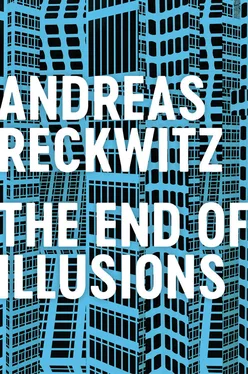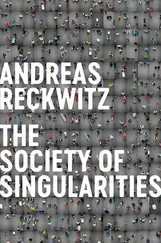In late-modern society, a third form of culturalization – Culturalization III (oriented toward cultural universality) – will certainly not be able to replace the powerful and dominant Culturalization I of hyperculture or the strongly identity-based Culturalization II of cultural essentialism. However, it could function as a critical counterforce that constructively engages with both the cultural reservoir of hyperculture and that of cultural communities. It remains an open question, however, whether the culture of the general will be able, within the framework of the society of singularities, to transcend the boundaries of socio-political debate and have an actual effect on social practices and institutions. Until then, it appears as though the conflict between hyperculture and cultural essentialism will continue to dominate our social reality.
1 1 Samuel P. Huntington, The Clash of Civilizations and the Remaking of World Order (New York: Simon & Schuster, 1996).
2 2 Raymond Williams, Culture and Society, 1780–1950 (New York: Columbia University Press, 1958).
3 3 On these various concepts of culture, see Andreas Reckwitz, Die Transformation der Kulturtheorien: Zur Entwicklung eines Theorieprogramms (Weilerwist: Velbrück Wissenschaft, 2000), pp. 64–90.
4 4 Ernst Cassirer, The Philosophy of Symbolic Forms, trans. Ralph Manheim, 3 vols. (New Haven, CT: Yale University Press, 1955–7).
5 5 See Reckwitz, The Society of Singularities, pp. 19–80.
6 6 Émile Durkheim, The Elementary Forms of Religious Life, trans. Joseph Ward Swain (London: G. Allen & Unwin, 1915).
7 7 Max Weber, The Protestant Ethic and the Spirit of Capitalism, trans. Talcott Parsons (New York: Charles Scribner’s Sons, 1930).
8 8 On the relevance of “culture” in postmodernity, see Fredric Jameson, Postmodernism, or, the Cultural Logic of Late Capitalism (London: Verso, 1991); and Scott Lash, Sociology of Postmodernism (London: Routledge, 1990).
9 9 For a model of culture as a “resource,” see also George Yúdice, The Expediency of Culture: Uses of Culture in the Global Era (Durham, NC: Duke University Press, 2003).
10 10 On the particular structure of markets for cultural goods, see also Pierre-Michel Menger, The Economics of Creativity: Art and Achievement under Uncertainty (Cambridge, MA: Harvard University Press, 2014).
11 11 For further discussion of cultural capitalism, see Scott Lash and Celia Lury, Global Culture Industry: The Mediation of Things (Cambridge: Polity, 2007); and Chapter 3 below.
12 12 Richard Florida, Cities and the Creative Class (New York: Routledge, 2005).
13 13 Georg Simmel, Sociology: Inquiries into the Construction of Social Forms, trans. Anthony J. Blasi et al. (Leiden: Brill, 2009).
14 14 On the new middle class, see Chapter 2 in this book.
15 15 This tendency is the impetus behind the postcolonial critique of the cultural appropriation of the powerless by the powerful.
16 16 On the concept of diversity, see Steven Vertovec, “‘Diversity’ and the Social Imaginary,” European Journal of Sociology, 53:3 (2012), pp. 287–312.
17 17 On the concept of hybridity, see Jan Nederveen Pieterse, “Globalization as Hybridization,” in Global Modernities, ed. Mike Featherstone et al. (London: SAGE, 2002), pp. 45–68.
18 18 See Bernhard Giesen, Kollektive Identität: Die Intellektuellen und die Nation 2 (Frankfurt am Main: Suhrkamp, 1999); and Manuel Castells, The Power of Identity (Cambridge, MA: Blackwell, 1997).
19 19 See Benedict Anderson, Imagined Communities: Reflections on the Origin and Spread of Nationalism, 2nd edn. (London: Verso, 1991).
20 20 For further discussion of this phenomenon, see Reckwitz, The Society of Singularities, pp. 286–309.
21 21 Of course, identity conflicts can also, in part, assume the form of cultural class struggles.
22 22 See Martin Riesebrodt, Rückkehr der Religionen? Zwischen Fundamentalismus und der “Kampf der Kulturen” (Munich: Beck, 2000), pp. 59–60; and Ronald F. Inglehart and Pippa Norris, “Trump, Brexit, and the Rise of Populism: Economic Have-Nots and Cultural Backlash,” Harvard Kennedy School Working Paper, no. RWP16-026 (2016). For further discussion, see also Chapter 2 below.
23 23 See Pankaj Mishra, Age of Anger: A History of the Present (New York: Farrar, Straus & Giroux, 2017); and Sebastian Conrad, What Is Global History? (Princeton University Press, 2016).
24 24 Beyond this strict dichotomy, there are also interesting hybridizations between the two regimes of culturalization. Muslim teenagers, for instance, can be portrayed by the media as having an “attractive style” within the framework of Western youth culture, and thus as functioning within the logic of Culturalization I. In this regard, they are participants in hyperculture’s markets of attention and valorization. However, if they are recruited to join an Islamist cause – to fight for ISIS, for instance – it is immediately thought that they have abandoned this logic and have firmly switched over to the logic of Culturalization II.
25 25 See Will Kymlicka, Multicultural Odysseys: Navigating the New International Politics of Diversity (Oxford University Press, 2007).
26 26 Karl Popper, The Open Society and Its Enemies: New One-Volume Edition (Princeton University Press, 2013), originally published in 1945.
27 27 For such a critique of hyperculture, see for instance Guillaume Paoli, Die lange Nacht der Metamorphose: Über die Gentrifizierung der Kultur (Berlin: Matthes & Seitz, 2017).
28 28 The result of incorporating individual goods into a global system of markets and appropriation is that, by claiming to be incomparable, the individual goods of hyperculture are in fact all the more likely to be compared with one another. This is the reason why, from a cultural-critical perspective, the elements of hyperculture happen to seem so similar that one often hears complaints about the absence of things that are radically “other” or different. On this topic, see Byung-Chul Han, Hyperkulturalität: Kultur und Globalisierung (Berlin: Merve, 2005).
29 29 See Terry Eagleton, The Idea of Culture (Oxford: Blackwell, 2000); and François Jullien, There Is No Such Thing as Cultural Identity, trans. Pedro Rodriguez (Cambridge: Polity, 2021).
30 30 On the culture of Romanticism, see Isaiah Berlin, The Roots of Romanticism, ed. Henry Hardy (Princeton University Press, 2014).
31 31 See Friedrich Schiller, On the Aesthetic Education of Man in a Series of Letters, trans. Elizabeth M. Wilkinson and L. A. Willoughby (Oxford: Clarendon Press, 1983).
32 32 On the distinction between community and society, see Helmuth Plessner, The Limits of Community: A Critique of Social Radicalism, trans. Andrew Wallace (New York: Humanity Books, 1999).
33 33 The leading ideas of global culture, global museums, and global cultural heritage all point in such a direction. In this regard, see Christoph Antweiler, Inclusive Humanism: Anthropological Basics for a Realistic Cosmopolitanism, trans. Diane Kerns (Göttingen: Vandenhoeck & Ruprecht, 2012).
34 34 See, for instance, John Dewey’s foundational book Democracy and Education: An Introduction to the Philosophy of Education (New York: Macmillan, 1916).
Конец ознакомительного фрагмента.
Текст предоставлен ООО «ЛитРес».
Прочитайте эту книгу целиком, купив полную легальную версию на ЛитРес.
Безопасно оплатить книгу можно банковской картой Visa, MasterCard, Maestro, со счета мобильного телефона, с платежного терминала, в салоне МТС или Связной, через PayPal, WebMoney, Яндекс.Деньги, QIWI Кошелек, бонусными картами или другим удобным Вам способом.









